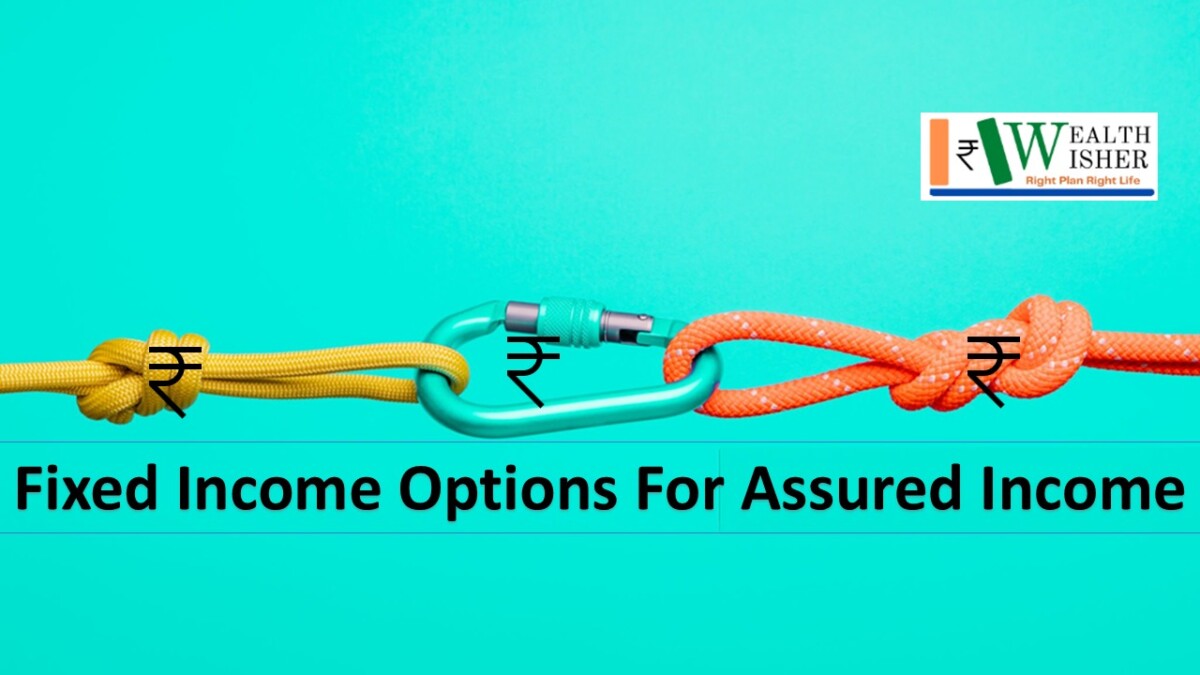Most Investors who prefer not to invest in Mutual Funds or Equities often ask, “What are the fixed income options for assured income?” Investors look for fixed income options on a periodic basis, mostly monthly. They also want their principal to be intact. Is this possible? Yes, very much, and there are multiple options.
Just a caveat here… Do not just decide on returns alone.
We all know that Risk & Returns go hand in hand. Returns are the by-product of the risk you are willing to take. Since the requirement here is – fixed income options for assured income, we cannot risk the principal & also we cannot risk, repayment as money is required on a fixed date.
These are not investment options for retirees only. However, some can only be invested once you are above 60. But some of these can cater to investors of all ages.
So let us check these –
Fixed Income Options for Assured Income
Pradhan Mantri Vaya Vandana Yojana (PMVVY)
This government-backed scheme is available through the Life Insurance Corporation (LIC) of India. It is designed specifically for senior citizens aged 60 years and above.
PMVVY offers a regular income with a lump-sum investment for a tenure of 10 years. The scheme provides an assured return on investment, making it a reliable option for retirees.
The interest rate is fixed by the government, and the scheme also offers a death benefit. The minimum purchase price is ₹1.5 lakhs, and the maximum is ₹15 lakhs. It also comes with a loan facility of up to 75% of the purchase price after three policy years.
Senior Citizens Saving Scheme (SCSS) 
The SCSS is a popular investment option among retirees due to its attractive interest rates and safety. It has a tenure of five years, which can be extended by an additional three years upon maturity.
The interest is paid quarterly, ensuring regular income. The current rate is 8.2%.
The scheme is backed by the government and is available through post offices and designated banks. The maximum investment limit is ₹30 lakhs, and the interest rate is reviewed and revised by the government every quarter. Premature withdrawals are allowed after one year, subject to penalties.
RBI Floating Rate Savings Bonds
These bonds are issued by the Government of India and have a tenure of seven years. The interest rate is linked to the National Savings Certificate (NSC) rate, which means it can vary every six months.
Interest is paid semi-annually, providing periodic income. Currently, the rate is 8.05% PA.
The bonds are available for investment to individuals, HUFs (Hindu Undivided Families), and charitable institutions. They are a low-risk investment option with the backing of the central government. The minimum investment is ₹1,000, and there is no maximum limit.
Post Office Monthly Income Scheme (POMIS) Account
The POMIS is a five-year investment plan available through post offices across India.
It offers a fixed monthly interest payout, making it a suitable option for those seeking regular income. The scheme has a maximum investment limit of ₹ 9 lakhs for a single account and ₹ 15 lakhs for a joint account.
The interest rate is determined by the government and reviewed quarterly. Currently the rate is 7.4% PA.
While the scheme does not offer tax benefits, it ensures the safety of the corpus and regular income for retirees. Premature withdrawals are allowed after one year with certain penalties.
Bank Fixed Deposits (FDs)
Bank FDs are a traditional and widely trusted investment option. Various banks offer fixed deposit schemes with different tenures and interest rates. Retirees can spread their investments across multiple FDs with varying maturities to ensure regular income.
The interest rate varies from bank to bank and is influenced by market/economic conditions. Senior citizens often get higher interest rates compared to regular customers. Fixed deposits come with flexible tenures ranging from a few months to several years.
Premature withdrawals are allowed, but they may attract penalties.
Company Deposits or Corporate Fixed Deposits
These are term deposits offered by non-banking financial companies (NBFCs) and other financial institutions. These deposits are held for a fixed period at a fixed rate of interest, typically higher than that offered by traditional bank FDs.
The tenure of company FDs can range from a few months to several years, providing flexibility based on the investor’s financial goals. It’s crucial to check the credit ratings of the issuing company, as higher-rated deposits (AAA or AA+) indicate better safety and reliability.
While company FDs offer better liquidity compared to traditional bank FDs, premature withdrawals may still attract penalties. Although company FDs offer higher returns, they come with a higher risk compared to bank FDs, as they are not covered by deposit insurance up to ₹5 lakh.
Investors should carefully assess the financial stability and creditworthiness of the issuing company before investing in company deposits. It’s advisable to choose deposits from reputable companies with strong credit ratings to ensure the safety of the principal amount and regular interest payments.
RBI Retail Direct Scheme
This scheme, launched by the Reserve Bank of India (RBI), allows individual investors to open a Retail Direct Gilt (RDG) account directly with the central bank.
Investors can directly invest in government securities without intermediaries. Securities include Government of India Treasury Bills, Government of India dated securities, Sovereign Gold Bonds (SGB), and State Development Loans (SDLs).
Investors need a Rupee savings bank account in India, a PAN, an officially valid document for KYC, a valid email ID, and a registered mobile number. Investors can access RBI’s electronic order matching system (NDS-OM) for trading in government securities in the secondary market.
Government securities are issued by the central or state government, so they are considered safe investments. Investors can invest in both short-term (mature within a year) and long-term (mature in more than one year) securities.








